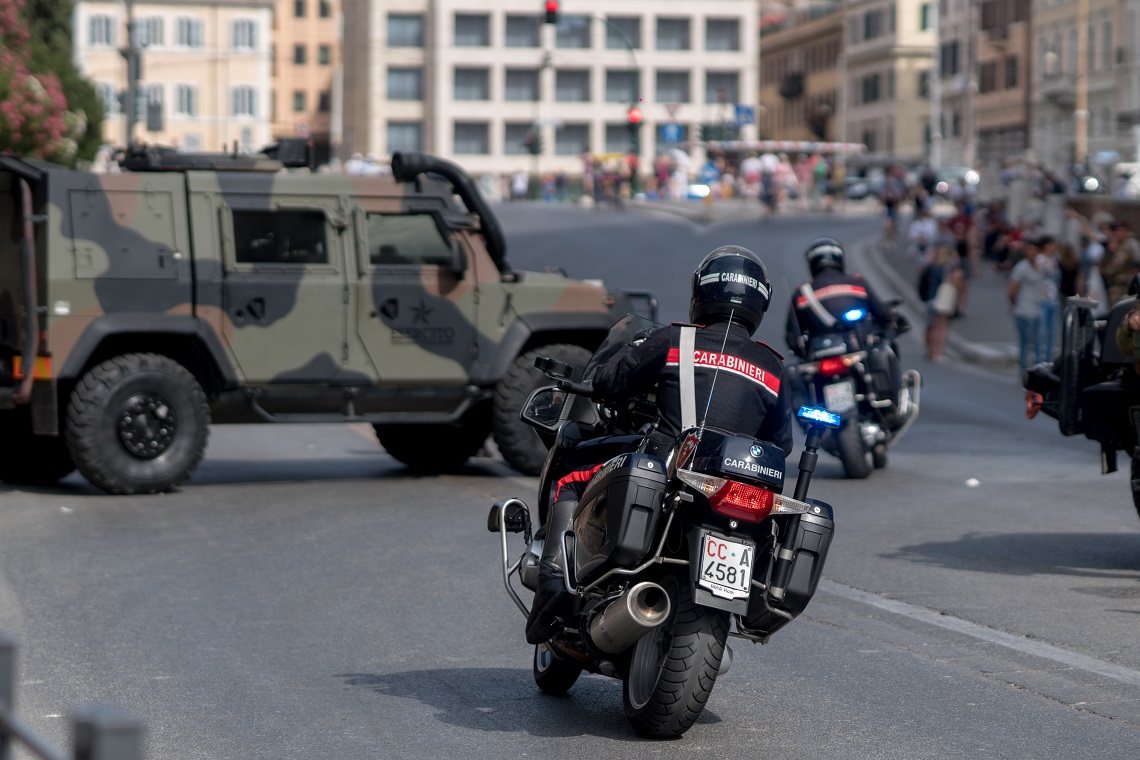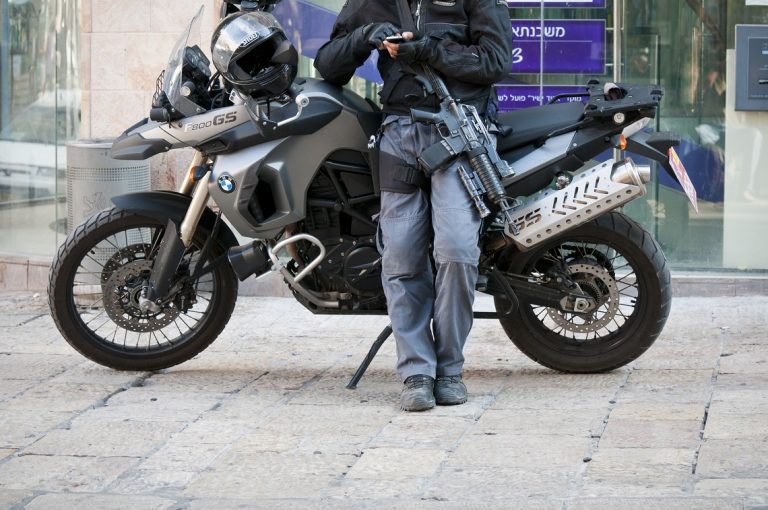Fresh from attending a hostile environment training course, Rob Slade outlines how best to prepare for your next off-the-beaten-track motorcycle adventure
Hostile environment awareness courses are typically aimed at business or media organisations that operate in potentially volatile or dangerous areas, but they can also be of great help to adventure motorcyclists. Things can go wrong when you travel, such as difficult border crossings, and it’s best if you know how to deal with sticky situations.
You may be heading off on your around the world ride, or you may be embarking on a tour of South America. Even if you’re just in Europe, there’s a possibility that a situation can head south, whether that be due to civil unrest, a terrorist attack or just finding yourself in the wrong area. With that said, it’s worth making sure you have as much information and knowledge as possible to keep yourself safe.
We recently took part in a hostile environment awareness course with HASP Training (www.hasptraining.co.uk), during which we learnt a great deal about improving safety and awareness while travelling. In the first of a two-part series, we want to share some of the valuable advice we learned about pre-trip planning. Below, you’ll find a selection of information that you can refer to for any of your upcoming trips.
Knowledge dispels fear The truth is, most of the fear we feel comes down to the unknown, whether it’s a new experience, place or something else. With that, it’s important to do as much research as you can, as the more you know, the happier you will be.
Putting in the right amount of preparation ultimately gives you more control of whatever situation you may find yourself in, as you’ll have a better idea of the factors at play. Plus, if you understand the background to any possible situation, you will be better equipped to deal with it. Having said that, it’s important to remember that a lot of your research will unearth negative stories rather than positive ones.
As is often the case, people are far more likely to write about their bad experiences, so try not to let your research overrule your overall impression of a place. Sure, be aware of some of the risks and hazards that are being brought up, but you can usually gain a more reliable view of a place by speaking to someone who has been recently or is currently there.
Research tools There are many tools that will allow you to research a country before you ride there. The first port of call should be the Foreign Commonwealth Office (www.gov.uk/foreign-travel-advice), which will cover a lot of the major issues you may need to know about. Beyond that, Travel Health Pro (www.travelhealthpro. org.uk) provides valuable insights into any health issues a country is facing.
A great tip is to try and reach out to someone on the ground, or someone who has recently visited the country in question. You could, of course, try embassies, or you could try reaching out to university professionals that specialise in particular regions. For example, the London School of Economics has an extensive database of people located all over the world, many of whom may well be able to help you (see www.lse.ac.uk/people).
Alternatively, whether you’re travelling independently or with a company, you could approach a reputable tour company or bike hire store that runs trips to the destination in question, as they are sure to have experts on the ground that can pass on information and advice.

What to research
It’s all well and good having the tools you need to research a destination, but you also need to know what sort of things you should be looking for. To get a complete overview of any area, there are many different topics you should be exploring.
Below, we have made a list of things you should delve into:
Health issues:
Do you need to provide proof of any vaccinations? Is there an epidemic in your target destination or a neighbouring country? Are there restrictions on specific types of medication or the quantities you are allowed to bring into the country? Legal issues: How does the legal system differ from the UK? Are certain things illegal that you might not know about? Will you be allowed access to legal representation and can you be held without charge?
Geographical issues:
Are you going to end up in an area which may be liable to flooding, landslides, earthquakes or any other type of natural disaster?
Political situation:
Is there an election going on, or is there trouble within the government? If there is unrest, you may be at risk of getting caught up in demonstrations, which can easily turn ugly.
Attitudes and customs:
Different cultures have different attitudes toward certain ideals and it’s important to be aware of these. Examples include attitudes toward alcohol, sexual orientation, women, and even how you sit or carry yourself in public.
Religion:
It’s important to check the predominant religions in the country you are visiting, or any specific cultural considerations. Be sure to make a note of any key religious dates. For example, it would certainly be handy to recognise you are travelling through a Muslim country during the month of Ramadan.
Entry requirements:
Knowing a country’s entry requirements is essential, and this isn’t just limited to having a visa and six months left on your passport. Some countries may insist you have a letter of invitation or even that you haven’t visited certain nations in recent years.
Conflict zones:
Sometimes, you may be riding in a country that is generally safe, except for a few areas where conflict has been known to arise. Whether it’s border areas, regions suscep tible to terrorism, or even lands run by cartels, educate yourself so you know to avoid them.
Road conditions:
Terrorism and violent crime may take many of the headlines when it comes to horror stories from the road, but the biggest killer is actually road traffic collisions. As a motorcyclist, it pays to be aware of the quality of the roads and the drivers on them. While it is always vital for us to keep a keen eye on other vehicles on the road, in certain countries you may be overwhelmed by the seemingly chaotic road conditions in front of you.
What you’ll need to take
A passport, visa and money are obvious items to take with you, but what else should you take? Well, it’s always handy to have several passport-style photos for any identification passes you may need to get, plus a laminated copy of the photo page of your passport kept in an easily accessible place. This will allow you to pull it out and hand it to officials quickly, without the worry about them disappearing with your actual passport.
It’s also important to have copies of your visa and travel insurance, as well as a list of important numbers (e.g. personal banks, embassies, key contacts in that country) in case of emergency. A handy little tip is to scan all of your documents and vital information into a computer and save it in a Dropbox or Google Drive folder. This means you’ll always be able to access them as long as you can get onto a computer. Sharing this folder with a family member or a friend will also help you out in the event that something goes wrong.
A couple of other key items you may want to think about taking include a door wedge, for keeping unwanted guests out of a room, and a first aid kit, in case something goes wrong. On that note, if you have an iPhone, you can download an app called TripWhistle, which provides you with your exact location and the right number for the local emergency services (Android alternatives are available).
What not to take
How far you take this depends entirely on where you are going and how much value you place on your possessions, but the general rule is to become as much of a chameleon as possible. By that, we mean become someone that doesn’t stand out as an easy target.
This can be tricky when riding an expensive bike through a poor area, but for times when you’re off your machine, this could mean not wearing flash clothes, leaving your expensive watch at home and using old, used gear rather than brand-spanking-new kit.
It’s often tempting to go out and invest in some great new gear before embarking on a trip, but if it’s colourful and incredibly crisp, you are going to draw attention to yourself. This isn’t always going to be an issue, but in countries where things can turn very quickly, you’ve got to weigh up the risks.
On this, the lighter you can travel, the better, as it means you’ll have less kit to lose and to worry about. This’ll help avoid opportunistic thieves who may take it upon themselves to pinch your gear from the back of your bike.
Want to learn more?
If you’d like to follow in our footsteps and attend a hostile environment awareness training course, take a look at HASP Training. The company was founded by safety and security instructor Rupert Godesen, who has spent over 27 years in the British Armed Forces and delivers the training in an engaging and interactive way.
Courses are available as one, two or three-day programmes and typically cover pre-trip preparation, in-country safety and first aid, though they can be tailored to individual needs. They are normally split between classroom sessions and a scenario day. The latter gives you the opportunity to put your newfound skills to the test in a situation that mimics what you may encounter in real life.
Find out more at www.hasptraining.co.uk

